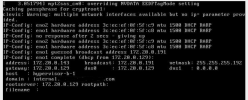I am considering to move from Hyper-V to Proxmox but want to have my systems fully encrypted with network unlock capability. With Hyper-V I am using Bitlocker & Bitlocker Network Unlock. I am aware of Clevis & Tang as a network unlock solution in the Linux domain, but haven´t seen any documentation, tutorial or other information on how to leverage that with Proxmox.
Is this supposed to work and if yes, how does one install or configure it? Anyone already succeeded doing so?
Best Regards,
Joachim
Is this supposed to work and if yes, how does one install or configure it? Anyone already succeeded doing so?
Best Regards,
Joachim



